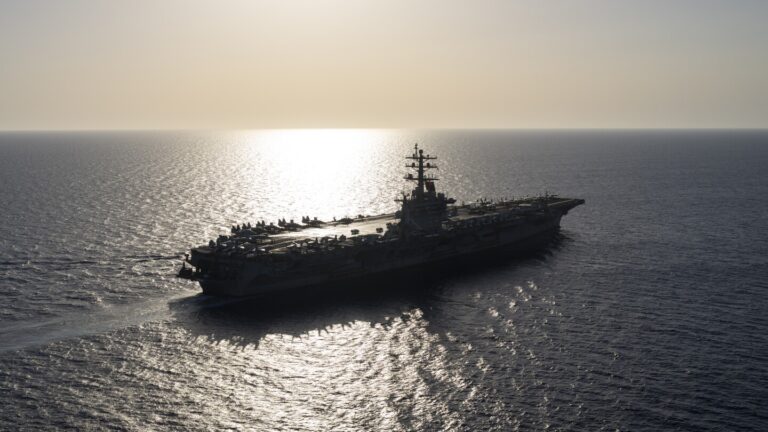Aboard the USS Dwight D. Eisenhower in the Red Sea (AP) — The USS Dwight D. Eisenhower may be one of the U.S. Navy’s oldest aircraft carriers, but it’s still fighting, despite repeated false claims. Yemen’s Houthi rebels.
The Houthis and online accounts supporting them have repeatedly claimed to have attacked or sunk an aircraft carrier in the Red Sea spearheading a U.S. response. Rebels continue to target both commercial and military vessels on important waterways.
This has put its leader, Capt. Christopher “Chowder” Hill, and his social media profiles squarely at the forefront of an increasingly bizarre internet as the campaign has worn on. And while he has downplayed his posts, they represent a new level of information warfare the Navy must fight. face the fiercest fighting since World War II And they’re trying to keep morale high for the roughly 5,000 troops aboard the Eisenhower and keep ammunition ready as the deployment drags on.
“I think in the last six months there’s been two or three instances where we’ve been allegedly sunk, but that’s not the case,” Hill told The Associated Press during a recent visit to the carrier. “It’s almost laughable now. They’re probably trying to bolster themselves with false reports, but it doesn’t work on us.”
The visit by two AP journalists and others to the Eisenhower was part of the Navy’s efforts to counter Houthi claims. During their roughly day-and-a-half stay aboard, the journalists, accompanied by sailors, walked the length and breadth of the nuclear-powered ship’s 1,092-foot (332-meter) interior. AP journalists also made multiple circles around the Eisenhower from above in a Seahawk helicopter.
Aside from some rust on its sides from the hot, humid Red Sea air and what appeared to be leaking pipes in the mess hall, the ship appeared undamaged. There was no blast damage or large holes on the flight deck, just the stench of jet fuel, oily puddles, and the screaming of F/A-18 fighter jets’ engines before they took off.
The other half of the information war is Hill, a Quincy, Massachusetts, native with a South Boston accent that’s easy to spot. Even the secretive Houthi leader, Abdul Malik al-Houthi, has mentioned the carrier by name in speeches and made false claims about it, but Hill has constantly sent out positive messages about its crew online.
Videos of flight operations from the bridge and images of sailors eating cookies in the captain’s chair are regular staples. After one false claim by the Houthis, Hill fired back by posting a picture of cinnamon rolls and muffins from the Eisenhower’s bakery, offering a subtle critique of the allegations.
“The purpose of our social media outreach is to connect with families and bring them closer to the ship,” Hill said, “so if we can post and spread pictures of their sons and daughters, husbands and wives, even fathers and mothers who are here, it brings families closer to us. Again, that’s our support network. But everyone else was watching what we were doing, so it also served another role.”
And “Star Wars” memes and images Captain DemoHill, a Labrador-golden retriever mix who roams the ship as a support animal for the crew, seems to particularly enjoy writing about the ship’s “Taco Tuesdays,” judging by Houthis’ posts.
“We’re going to celebrate Taco Tuesday because it’s my favorite day of the week, and it never ends,” the captain said. “If you want to call it information warfare operations, call it that. At the end of the day, that’s what I am.”
But morale remains a major concern for Hill and other leaders aboard the ship. The Eisenhower and its allied ships have made just one short port call in Greece during its eight-month tour so far. It is also the most deployed carrier in the entire U.S. fleet over the past five years, according to an analysis by the Naval Institute News Service.
One sailor, Lt. Joseph Hill, from Raleigh, North Carolina, wore a patch that read, “Go Navy, Defeat the Houthis,” a play on a classic chant at the annual Army-Navy football game, but the naval aviator stressed that he recognized the seriousness of the battle.
“The stress of knowing that you’re under fire every day just adds to the overall reality that this is not a normal deployment,” Hill said.
Meanwhile, munitions are also a concern. Navy Secretary Carlos del Toro told the Senate Armed Services Committee in May that the Navy has spent at least $1 billion on military equipment in the Red Sea battle. Every crew member aboard the Eisenhower who spoke to The Associated Press acknowledged that the Navy is trying to use the right weapons against the Houthis, who are waging an asymmetric war and using much cheaper munitions.
“My sailors, my ship, are priceless. I don’t ask my captain to make that calculation,” said Capt. David Rowe, the admiral in charge of the guided-missile destroyers that escort the Eisenhower. “Maintaining ammunition depth and having more missiles, using the right weapons systems for the right threats, is certainly a proper tactical issue.”
For now, the Eisenhower continues to patrol with the cruiser Philippine Sea and the destroyers Gravely and Mason. It has already been extended twice And there’s always the chance it could happen again, but Hill said his crew is ready to fight and he remains ready to continue as captain in his own style.
“At one point in my career, I had a revelation that one of the things every human being needs is to be loved and cherished,” Hill said, “so as a leader, I shouldn’t be afraid to try to love and cherish everybody, and I should also expect other leaders that I’m responsible for to love and cherish their Sailors.”
___
Read the AP report here https://apnews.com/hub/israel-hamas-war

